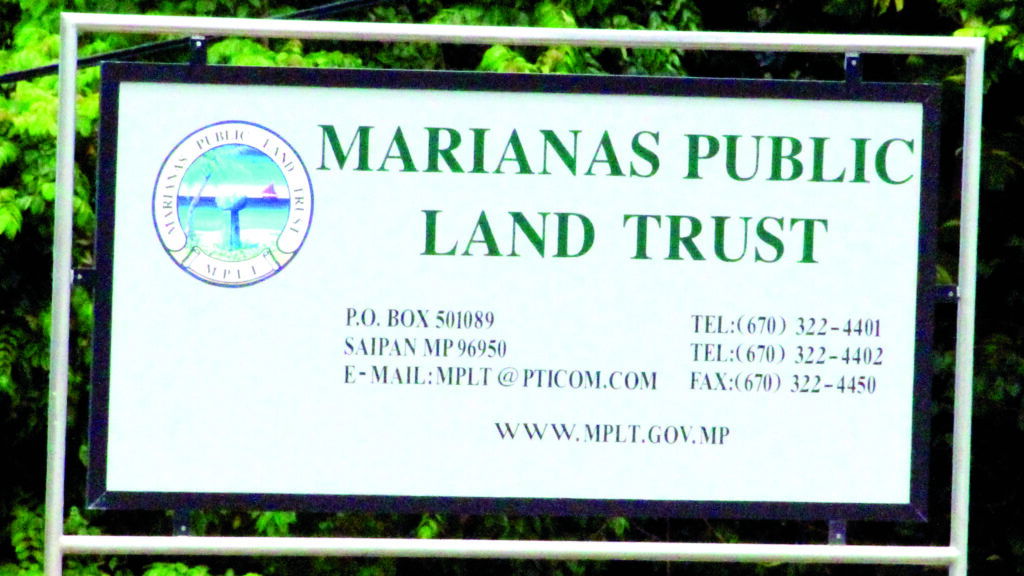UNSUPPORTED by facts and history.
This is how the Marianas Public Land Trust described Senate Legislative Initiative 22-5, which proposes to give the governor and the Legislature oversight and appropriation powers over MPLT.
Authored by Senate Vice President Justo Quitugua, S.L.I. 22-5 would “require MPLT and its board of trustees to exercise transparency and accountability as a Commonwealth government entity, to provide for reasonable expenses of administration by law, and to require the annual operating budget of the trust to be approved and appropriated by the Legislature.”
S.L.I. 22-5 states that “the governor and the Legislature must have oversight powers over MPLT in order to ensure that the trustees’ actions are made consistent with their fiduciary duties and in the best interest of the Commonwealth and the people.”
In their response to the request of Senate Fiscal Affairs Committee Chairman Victor B. Hocog for comment, the trustees, headed by Chairman Martin B. Ada, expressed “great concern and disappointment,” saying that the legislative initiative’s findings are “misinformed and selectively ignore the substantial return on investments MPLT has produced for the CNMI, as well as its diversified local investments.”
The trustees recommended that S.L.I. 22-5 be shelved, saying they will be happy to confer with the committee and “respond with full transparency and accountability as to MPLT’s investments, administration and activities.”
“While the trustees look forward to the opportunity to further conference with your committee to expand on the foregoing discussion,” they added, “we submit these comments with the respectful suggestion that S.L.I. 22-5 is both unsupported by the facts and history of MPLT as well as unnecessary in its purpose. The trustees have always welcomed transparent scrutiny of their decisions and investments. However, a proposed constitutional legislative initiative grounded in ad hominem attacks on the trustees is simply untenable. We respectfully suggest that your committee recommend against its further consideration.”
Misinformed, objectionable
The trustees noted S.L.I. 22-5’s “broad-stroke” conclusion that MPLT’s operations, functions, duties and powers “are not clearly defined” and “lack of clear responsibilities has led to confusion, contradictory interpretations, and dissension among past administrations, MPLT trustees and members of the Legislature.”
The legislative initiative likewise alleged that MPLT trustees do not file financial statements.
This is incorrect, the trustees said.
They said each trustee has and continues to file their financial disclosure statement pursuant to the CNMI Ethics Act with the Office of Public Auditor.
The trustees comply with the CNMI Ethics Act, and “there is no other law provided on this issue,” they added.
A constitutional amendment as proposed by the legislative initiative is not necessary, as there is already a law in place that applies to the trustees — the CNMI Ethics Act “as well as the Restatement (Third) of Trusts incorporated under 7 CMC Section 3401,” the trustees said.
Every audit or review by OPA has never made any finding that any trustee has failed to file nor refused to file any financial disclosure statement, the trustees said.
They reiterated that S.L.I. 22-5’s statement that trustees do not file financial disclosure statements is both incorrect and constitutes a misreading of Section 6 (f) of the CNMI Constitution’s Article 11.
Moreover, the trustees said, they follow the CNMI government travel policy. In their administrative and governance policies, the trustees have implemented the travel policies of the executive branch. The CNMI Constitution, they noted, has discussed the trustees’ compensation, which is to be on a per diem basis, meaning, on a per day basis.
“The trustees have discussed the reasonable compensation for trustees administering similar trusts in arriving at compensation rates per day. Of more importance is that each year MPLT has commissioned the full audit of its finances, activities and operations and which audits have been produced not only to OPA but also to the Legislature, the executive branch and the public. The issues of trustee compensation, while there have been differing views, have focused on the necessity of the frequency of meetings that were an issue in 2006, over 15 years ago, and [this has] been corrected by the trustees’ own changes to the current policy.”
Annual budget
As to MPLT’s annual budget, the trustees said there is a good reason that the CNMI Constitution and the Planning and Budgeting Act do not compel legislative approval. They cited Section 6 (d) of the CNMI Constitutions which states, “This provision makes the trust independent of either the executive or legislative branches of the government but does not prohibit the trustees from using funds appropriated by the Legislature.”
This “makes it clear that the trustees are authorized by the Constitution to ‘retain sufficient funds for the administration of the trust.’ Moreover, MPLT is designed to be ‘independent of either the executive or legislative branches.’ This independence of MPLT, as constitutionally created entity was also recognized by the CNMI Superior Court,” the trustees said.
Thus, the proposal to require MPLT to submit its budget to the Legislature for appropriation, “would be an unconstitutional intrusion into the trustees’ functions.”
Aside from consistent oversight by OPA, the trustees also provide the Legislature and the governor MPLT’s annual report.
“Of more particular import, that apart from strict fiduciary liability, (which means personal responsibility) each trustee is subject to removal by the governor for any reasons including malfeasance or incompetence. At the same time, the trustees have met with the members of the Legislature on many occasions through the years and have had a fully transparent relationship with the executive and legislative branches even though the trustees are fully independent,” the trustees said.
A legislative initiative must be passed by three-fourths of the members of each house present and voting. The governor cannot veto a legislative initiative, but it must be approved by voters themselves.












